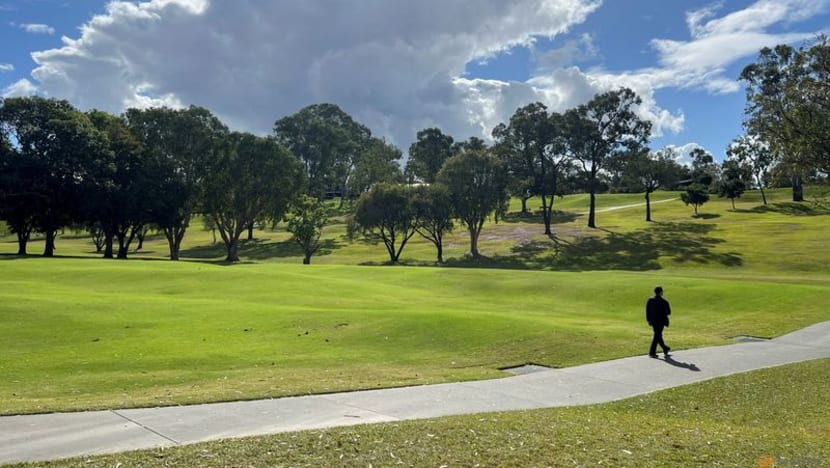Sports
Indigenous Group Seeks Federal Protection for Brisbane Stadium Site

A coalition representing the Yagara and Magandjin peoples has formally requested the Australian federal government to grant permanent protection to the site designated for Brisbane’s main stadium for the **2032 Olympics**. On **October 3, 2023**, the group submitted their application under the **Aboriginal and Torres Strait Islander Heritage Protection Act**, seeking to preserve the area known as **Barrambin**, or Victoria Park, as a “significant Aboriginal area”.
Elder Gaja Kerry Charlton, representing the Yagara Magandjin Aboriginal Corporation (YMAC), expressed profound concern over the future of Barrambin. “Barrambin is living country, possessing sacred, ancient and significant relationships within our cultural heritage systems,” Charlton stated. He described the announcement of the stadium plans by Queensland Premier David Crisafulli as a “complete shock,” highlighting fears regarding potential harm to ancient trees, artefacts, and vital ecosystems, as well as the possibility of ancestral remains in the area. “We stand resolute in our responsibility to protect it,” he added.
The stadium project, which is set to accommodate **63,000** spectators, was unveiled by Crisafulli in **March 2023**. As part of the Olympic developments, plans also include rebuilding Victoria Park’s Centenary Pool to transform it into a **25,000-seat aquatics centre**. In **June 2023**, the Queensland government passed legislation exempting these Olympic construction projects from standard planning regulations, a move that has drawn considerable criticism.
The Save Victoria Park campaign, which aligns with YMAC in their advocacy, condemned the June legislation as “unprecedented,” claiming it undermines existing environmental protections and the rights of First Nations peoples. Spokesperson Sue Bremner stated, “We estimate the majority of the parkland and hundreds of mature trees will now be sacrificed.” Bremner emphasized the gravity of the situation, asserting, “As we face this profound and irreversible loss of cultural heritage and human rights, Olympic organisers continue to promote 2032 as being the first Games with a Reconciliation Action Plan. It is simply astounding.”
Despite these concerns, Andrew Liveris, President of the organising committee for the Olympics, reassured the public last month that any objections to the development would be acknowledged. Nonetheless, he maintained that the June legislation was critical for ensuring timely completion of the venues ahead of the Games.
The clash between development and preservation raises significant questions about the balance between hosting a major international event and respecting indigenous rights and cultural heritage. As planning for the **2032 Olympics** progresses, the outcome of the Yagara and Magandjin peoples’ application for federal protection will be closely monitored.
-

 Business5 months ago
Business5 months agoKenvue Dismisses CEO Thibaut Mongon as Strategic Review Advances
-

 Lifestyle4 months ago
Lifestyle4 months agoHumanism Camp Engages 250 Youths in Summer Fest 2025
-

 Sports4 months ago
Sports4 months agoDe Minaur Triumphs at Washington Open After Thrilling Comeback
-

 Sports5 months ago
Sports5 months agoTupou and Daugunu Join First Nations Squad for Lions Clash
-

 Top Stories5 months ago
Top Stories5 months agoColombian Senator Miguel Uribe Shows Signs of Recovery After Attack
-

 World5 months ago
World5 months agoASEAN Gears Up for Historic Joint Meeting of Foreign and Economic Ministers
-

 Health4 months ago
Health4 months agoNew Study Challenges Assumptions About Aging and Inflammation
-

 Business5 months ago
Business5 months agoOil Prices Surge Following New EU Sanctions on Russia
-

 Entertainment4 months ago
Entertainment4 months agoDetaşe-Sabah Violin Ensemble Captivates at Gabala Music Festival
-

 Entertainment4 months ago
Entertainment4 months agoBaku Metro Extends Hours for Justin Timberlake Concert
-

 Top Stories5 months ago
Top Stories5 months agoRethinking Singapore’s F&B Regulations Amid Business Closures
-

 Business5 months ago
Business5 months agoU.S. House Approves Stablecoin Bill, Sends to Trump for Signature









